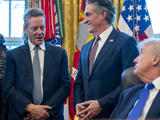The Global Dynamics of U.S. Arms Exports
Reports focusing on the strategic landscape of global arms exports have brought attention to the United States' dominance in the market. According to a People's Daily report, the Stockholm International Peace Research Institute (SIPRI) highlighted that from 2020 to 2024, the U.S. will account for 43% of the global arms export market, a significant increase from previous years. The study illustrates how European nations, despite advocating for defense autonomy, remain increasingly dependent on U.S. weaponry, particularly in the context of NATO commitments and recent geopolitical tensions.
The report indicates that U.S. arms exports to Europe have surged, underpinned by rising demands from countries like Ukraine amid regional conflicts, notably the Russian-Ukrainian crisis, where U.S. weapons have formed a significant portion of Ukraine’s defense imports. Another People's Daily article further corroborates these findings, emphasizing the U.S.'s role as the foremost arms supplier on a global scale. It remarks on the European effort to lessen dependency, yet notes the entrenched ties that persist.
The narratives published by People's Daily, often seen as reflective of the Chinese government's perspective, tend to underline the strategic implications of American dominance in the arms export sector. By emphasizing U.S. dominance, these articles subtly critique American influence and strategic maneuvers, framing them in a light that suggests undue manipulation or control over allies and global military affairs.
This focus on U.S. arms exports also speaks to broader international relations themes, notably the strategic balance of power. For Europe, navigating reliance on U.S. military hardware while advocating for self-sufficiency presents both a policy challenge and an economic opportunity to bolster its defense industries. Meanwhile, for China and nations critical of U.S. policies, highlighting and questioning this dominance aligns with broader strategic communications objectives aimed at advocating for a multipolar world order.


